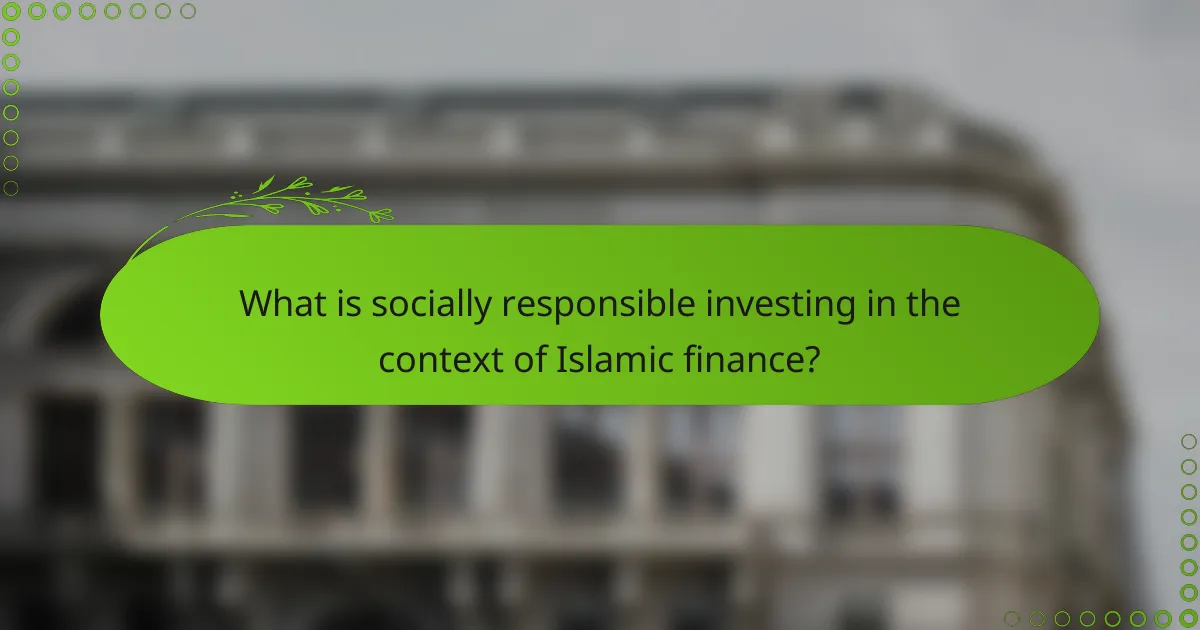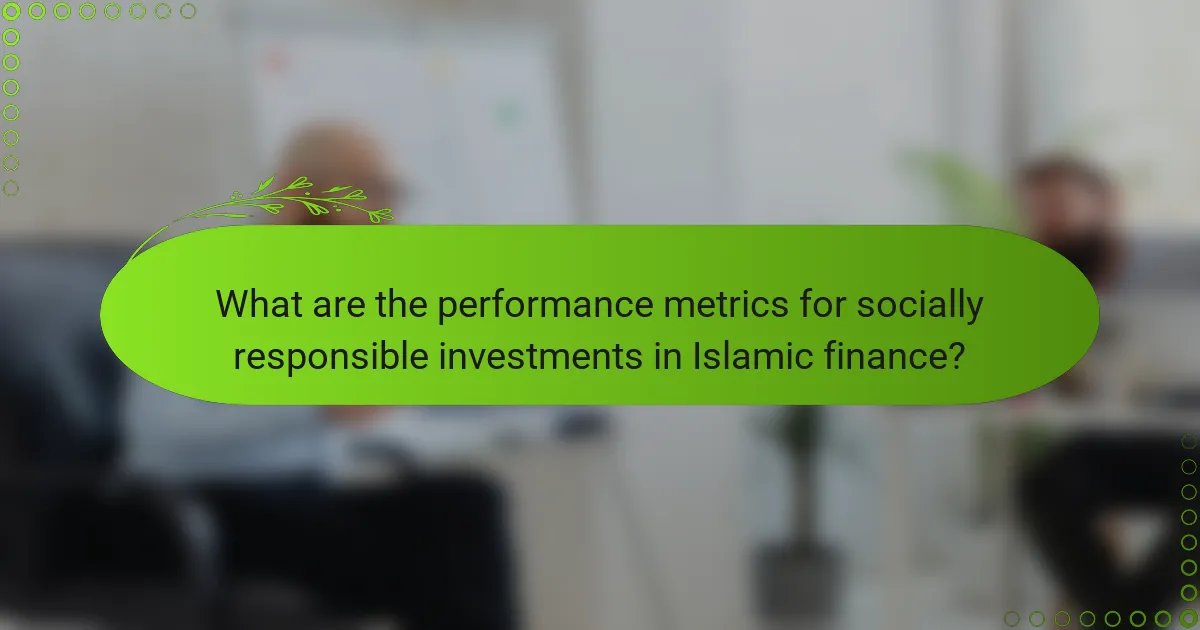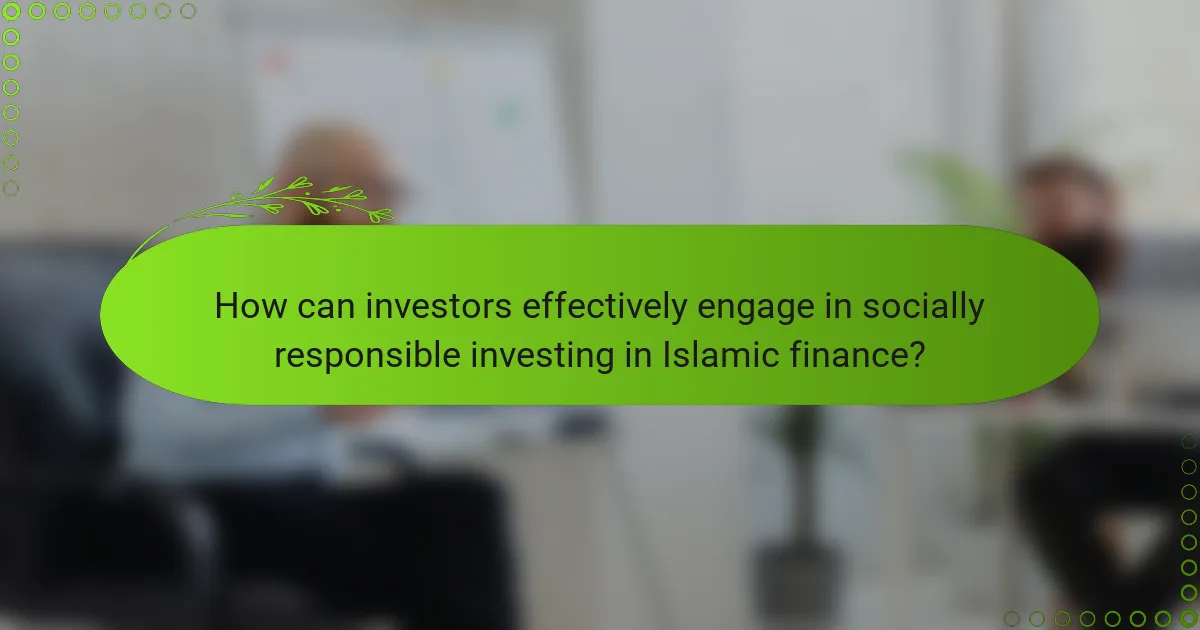
What is socially responsible investing in the context of Islamic finance?
Socially responsible investing in the context of Islamic finance refers to investment practices that align with Islamic ethical principles. This form of investing prohibits activities considered haram, such as gambling, alcohol, and interest-based transactions. Instead, it emphasizes investments that promote social good and economic development. Islamic finance encourages investments in sectors that benefit society, such as healthcare, education, and renewable energy. The principles of Shariah compliance guide these investment decisions, ensuring they adhere to Islamic law. By integrating ethical considerations, socially responsible investing seeks to achieve both financial returns and positive societal impact.
How does socially responsible investing align with Islamic principles?
Socially responsible investing (SRI) aligns with Islamic principles through the emphasis on ethical and moral investment practices. Islamic finance prohibits investments in haram (forbidden) activities such as alcohol, gambling, and usury. SRI shares this ethical focus by avoiding companies that engage in harmful practices.
Additionally, both SRI and Islamic finance promote social justice and community welfare. They encourage investments that contribute positively to society, such as renewable energy and healthcare.
Islamic principles also emphasize risk-sharing and fairness in financial transactions. SRI supports these concepts by fostering transparency and accountability in investments.
In summary, SRI’s ethical guidelines, focus on social good, and commitment to fairness align closely with Islamic financial principles.
What are the key tenets of Islamic finance that influence socially responsible investing?
The key tenets of Islamic finance influencing socially responsible investing are prohibitions on riba (interest), gharar (excessive uncertainty), and haram (forbidden) activities. Riba ensures that financial transactions do not exploit borrowers. Gharar promotes transparency and fairness in contracts. The prohibition of haram activities aligns investments with ethical standards. These principles encourage investments that contribute positively to society. They foster economic justice and social welfare. Islamic finance emphasizes risk-sharing, promoting equitable growth. This framework supports sustainable development and ethical investment practices.
How do Islamic ethical guidelines shape investment choices?
Islamic ethical guidelines shape investment choices by prohibiting investments in haram (forbidden) activities. These activities include gambling, alcohol, and pork production. Investors must also consider social justice and ethical practices. Investments should promote welfare and avoid harm to society. The principles of risk-sharing and profit-sharing are emphasized in Islamic finance. This framework encourages equitable distribution of wealth. Investors seek opportunities that align with Islamic values. Compliance with Sharia law is essential for legitimacy. These guidelines create a distinctive approach to socially responsible investing.
What are the main strategies employed in socially responsible investing?
The main strategies employed in socially responsible investing (SRI) include negative screening, positive screening, and impact investing. Negative screening involves excluding companies or sectors that do not align with ethical values, such as tobacco or fossil fuels. Positive screening focuses on investing in companies that meet specific social or environmental criteria, promoting sustainable practices. Impact investing seeks to generate measurable social or environmental benefits alongside financial returns. These strategies are designed to align investment portfolios with the investor’s values while also aiming for competitive financial performance.
How do investors screen potential investments for ethical compliance?
Investors screen potential investments for ethical compliance by applying specific criteria. They often use environmental, social, and governance (ESG) metrics to evaluate companies. These metrics assess how a company performs in areas like sustainability, labor practices, and corporate governance.
Additionally, investors may utilize negative screening to exclude industries that conflict with their ethical values, such as tobacco or fossil fuels. Positive screening identifies companies that actively promote social good or environmental stewardship.
Research indicates that 79% of institutional investors consider ESG factors in their investment analysis (Source: Global Sustainable Investment Alliance, 2021). This approach helps ensure that investments align with ethical standards and social responsibility.
What role do community development and social impact play in investment strategies?
Community development and social impact are integral to investment strategies in socially responsible investing. They guide investors to consider the broader effects of their investments on society. By prioritizing community development, investors aim to enhance economic opportunities and improve living conditions. Social impact focuses on generating positive outcomes for communities, such as education and healthcare improvements. Research indicates that investments with social impact can lead to better financial performance. For instance, a study by Morgan Stanley found that sustainable equity funds outperformed traditional funds by 4.3% from 2004 to 2018. This evidence supports the notion that aligning investments with community and social goals can yield both ethical and financial benefits.

What are the performance metrics for socially responsible investments in Islamic finance?
Performance metrics for socially responsible investments in Islamic finance include financial returns, risk-adjusted returns, and social impact assessments. Financial returns measure the profitability of investments. Risk-adjusted returns evaluate returns relative to the risk taken. Social impact assessments gauge the positive contributions of investments to society. Metrics also consider adherence to Shariah compliance, which is essential in Islamic finance. Studies show that socially responsible investments can achieve competitive returns compared to conventional investments. For instance, research by the University of Cambridge indicates that Islamic funds often perform similarly or better than conventional peers.
How do socially responsible investments compare to traditional investments in terms of returns?
Socially responsible investments (SRIs) often yield returns comparable to traditional investments. Research indicates that SRIs can perform on par with or even outperform conventional portfolios. A 2020 study by the Morgan Stanley Institute for Sustainable Investing found that 88% of sustainable funds outperformed their traditional counterparts during market downturns. Additionally, a 2019 report from the Global Sustainable Investment Alliance noted that sustainable investments have seen significant growth, indicating strong market demand and resilience. These findings suggest that SRIs are not only ethically aligned but also financially viable.
What factors contribute to the performance of socially responsible investments?
Performance of socially responsible investments (SRIs) is influenced by several key factors. These factors include the financial performance of underlying assets, investor sentiment towards ethical considerations, and regulatory frameworks promoting sustainability. Research shows that companies with strong environmental, social, and governance (ESG) practices often outperform their peers. A study by Friede, Busch, and Bassen (2015) analyzed over 2,000 empirical studies and found that around 90% indicated a positive relationship between ESG criteria and corporate financial performance. Additionally, market trends increasingly favor sustainable investments, driving demand and enhancing performance. Investor awareness and education about SRIs also play a crucial role in shaping investment decisions and outcomes.
How can investors assess the risk associated with these investments?
Investors can assess the risk associated with socially responsible investments by analyzing various factors. They should evaluate the financial performance of the investment. Historical data can provide insights into volatility and returns.
Investors should also consider the underlying assets’ compliance with ethical guidelines. This includes reviewing the social and environmental impact of the investments. Engaging with third-party ratings and rankings can help gauge sustainability performance.
Furthermore, investors can conduct scenario analysis to project potential outcomes under different market conditions. Diversification across sectors can mitigate specific risks tied to socially responsible investments.
Finally, staying informed about regulatory changes affecting socially responsible investing is crucial. These factors collectively aid investors in making informed decisions regarding risk assessment.
What challenges do investors face in socially responsible investing within Islamic finance?
Investors face several challenges in socially responsible investing within Islamic finance. One primary challenge is the limited availability of Sharia-compliant investment options. Many socially responsible investments do not align with Islamic principles, which restrict investments in certain sectors. The lack of standardized definitions for socially responsible investing in Islamic finance adds to the complexity. Investors also struggle with the assessment of ethical performance, as there is no universally accepted metric. Additionally, navigating the regulatory landscape can be difficult due to varying interpretations of Sharia law. Market volatility can further complicate investment decisions, as socially responsible investments may not always provide stable returns. Finally, the integration of social and ethical considerations into investment strategies requires a deeper understanding of both finance and Islamic teachings.
How do regulatory frameworks impact socially responsible investing?
Regulatory frameworks significantly influence socially responsible investing (SRI). These frameworks establish guidelines that promote transparency and accountability in investment practices. They can encourage investors to prioritize environmental, social, and governance (ESG) factors. For example, regulations may mandate the disclosure of ESG risks, which informs investor decisions. Additionally, frameworks can incentivize companies to adopt sustainable practices through tax benefits or grants. In regions like the European Union, stringent regulations have led to increased SRI flows. Data from the Global Sustainable Investment Alliance shows that sustainable investments reached $30.7 trillion in 2020, partly due to supportive regulations. Thus, regulatory frameworks play a crucial role in shaping the landscape of socially responsible investing.
What are the common misconceptions about the performance of socially responsible investments?
Common misconceptions about the performance of socially responsible investments (SRI) include the belief that they underperform compared to traditional investments. Research by the Morgan Stanley Institute for Sustainable Investing shows that sustainable equity funds often match or exceed the performance of conventional funds. Another misconception is that SRI limits investment choices. In reality, there are a wide variety of sectors available for investment within SRI. Some investors think that socially responsible investments are only for ethical reasons and not for financial returns. However, studies indicate that SRIs can provide competitive returns while aligning with personal values. Lastly, there is a belief that SRI is a passing trend. In fact, the global market for sustainable investments reached over $30 trillion in 2018, indicating sustained growth and interest.

How can investors effectively engage in socially responsible investing in Islamic finance?
Investors can effectively engage in socially responsible investing in Islamic finance by adhering to Shariah-compliant principles. This involves selecting investments that promote ethical practices and avoid prohibited activities such as gambling and alcohol. Investors should conduct thorough research on potential investments to ensure they align with both social responsibility and Islamic law.
Utilizing Shariah advisory boards can provide guidance on compliant investment options. Investors can also consider funds specifically designed for socially responsible investing within Islamic finance. According to the Global Sustainable Investment Alliance, the growth of sustainable investing has been significant, indicating a rising interest in ethical investment strategies.
By focusing on sectors that contribute positively to society, such as renewable energy and healthcare, investors can align their portfolios with their values. Regularly assessing the impact of investments on social and environmental factors is also crucial for maintaining alignment with socially responsible goals.
What best practices should investors follow when selecting socially responsible investments?
Investors should follow several best practices when selecting socially responsible investments. First, they should define their values and priorities clearly. This helps in identifying which social and environmental issues are most important. Next, investors should conduct thorough research on potential investments. This includes analyzing a company’s practices, policies, and performance related to sustainability and social responsibility.
Investors should also utilize ESG (Environmental, Social, and Governance) criteria as a framework for evaluation. These criteria help in assessing the ethical impact and sustainability of investments. Additionally, seeking third-party ratings can provide valuable insights. Organizations like MSCI and Sustainalytics offer ratings that evaluate companies based on their social responsibility efforts.
Another best practice is to diversify investments across various sectors. This reduces risk while supporting a wider range of socially responsible initiatives. Lastly, investors should stay informed about trends and changes in the socially responsible investment landscape. This ensures that their investments align with evolving standards and practices.
How can investors evaluate the social impact of their investments?
Investors can evaluate the social impact of their investments by using specific metrics and frameworks. They often utilize tools like the Global Impact Investing Network’s IRIS metrics. These metrics assess social, environmental, and financial performance. Investors may also conduct stakeholder consultations to gather qualitative data on community effects. Social Return on Investment (SROI) analysis quantifies social value against investment costs. Additionally, third-party ratings from organizations like B Corporation provide standardized assessments. Research shows that companies with high social impact often outperform their peers financially. This correlation supports the importance of evaluating social impact in investment decisions.
What resources are available to guide investors in this niche?
Investors in socially responsible investing within Islamic finance can access various resources. Key resources include academic journals that publish research on Islamic finance principles and socially responsible investing. The Journal of Islamic Finance and the International Journal of Islamic and Middle Eastern Finance and Management are notable examples.
Additionally, organizations like the Islamic Financial Services Board provide guidelines and standards for ethical investing. Books such as “Islamic Finance: Principles and Practice” by Hans Visser offer foundational knowledge. Online platforms, including webinars and courses from universities, also serve as valuable educational tools.
Finally, investment firms specializing in Islamic finance often provide insights and reports on market trends and performance metrics. These resources collectively help investors make informed decisions in this niche.
What are the future trends in socially responsible investing within Islamic finance?
Future trends in socially responsible investing within Islamic finance include increased integration of ESG criteria. Islamic finance is focusing on environmental, social, and governance factors. This shift aligns with global sustainability goals. There is a growing demand for ethical investment options. Investors are seeking Sharia-compliant funds that also prioritize social responsibility. Technological advancements are facilitating better transparency in investments. Digital platforms are emerging to connect socially responsible projects with investors. Regulatory frameworks are evolving to support sustainable finance initiatives. Overall, these trends indicate a stronger emphasis on responsible investing in the Islamic finance sector.
How is technology influencing socially responsible investing practices?
Technology is significantly influencing socially responsible investing (SRI) practices by enhancing data accessibility and analysis. Advanced analytics tools enable investors to evaluate environmental, social, and governance (ESG) metrics more efficiently. Artificial intelligence and machine learning algorithms assist in identifying trends in SRI performance. Blockchain technology increases transparency in transactions and helps trace the ethical sourcing of investments. Additionally, digital platforms facilitate crowd-funding for socially responsible projects, broadening investment opportunities. A report by the Global Sustainable Investment Alliance indicates that global sustainable investment reached $35.3 trillion in 2020, highlighting the growing impact of technology on SRI. Thus, technology plays a crucial role in shaping the future of socially responsible investing.
What emerging sectors show promise for socially responsible investments in Islamic finance?
Emerging sectors that show promise for socially responsible investments in Islamic finance include renewable energy, healthcare, and sustainable agriculture. Renewable energy projects align with Islamic finance principles by promoting environmental sustainability. The global renewable energy market is projected to grow significantly, with investments expected to exceed $2 trillion by 2025. Healthcare investments focus on providing essential services while adhering to ethical standards. The global healthcare market is projected to reach $11.9 trillion by 2027. Sustainable agriculture supports food security and ethical farming practices. The sustainable agriculture market is estimated to grow to $24 billion by 2025. These sectors align with the values of Islamic finance, promoting social welfare and environmental stewardship.
Socially responsible investing (SRI) in the context of Islamic finance encompasses investment practices that align with Islamic ethical principles, prohibiting activities deemed haram and promoting social good. This article explores the alignment of SRI with Islamic principles, key tenets of Islamic finance, and the strategies employed in ethical investing. It discusses performance metrics, challenges faced by investors, and the role of regulatory frameworks in shaping investment decisions. Additionally, the article highlights future trends and emerging sectors within socially responsible investments, emphasizing the importance of community development and social impact.